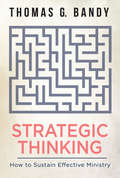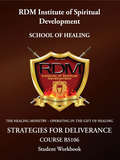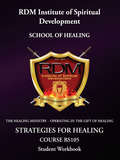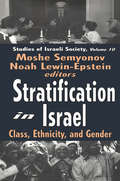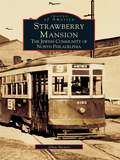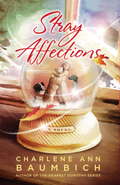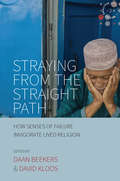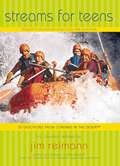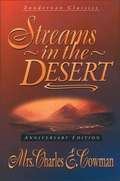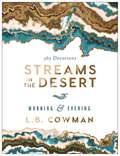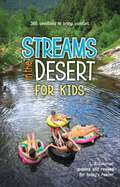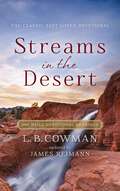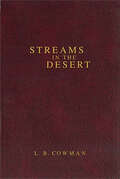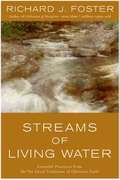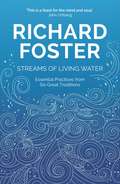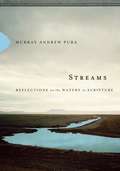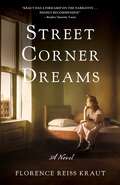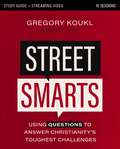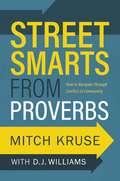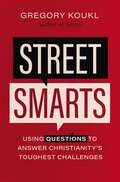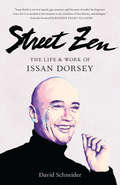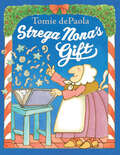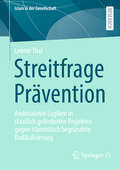- Table View
- List View
Strategic Thinking: How to Sustain Effective Ministry
by Thomas G. BandyLearn to set priorities and have the courage to take reasonable risks.Church leaders know how to think reactively. They know how to recognize their strengths and weaknesses and identify their opportunities and threats. They react to any number of emerging situations. What they don't do is think ahead to sustain effective ministries.They know how to plan strategically. They know how to choose new curricula, tap new sources of funding, recruit committees, and manage time. Church leaders often do not know how to think strategically, looking around and ahead to keep pace with society. Five year plans become irrelevant after five weeks. Strategies generated from leadership retreats collect dust in closets. In Strategic Thinking, Tom Bandy provides step-by-step plans to guide church leaders to set boundaries, align resources to visions, and hold church leaders and members accountable for integrity and purpose. In this book, you will learn how to reliably and regularly research the community surrounding your church, discern divine presence, and assess effectiveness. You'll find tools to help you set priorities and have the courage to take reasonable risks.It is possible for church leaders to think strategically. Do not unnecessarily throw up your hands in despair, react to whatever happens next, or surrender to some authority (individual or institutional) that will tell you what to do. The methods in this book provide a way to make good decisions and timely adjustments to get measurable results.
Strategies For Deliverance Course: Bs106 Student Workbook
by Robin DinnanauthThis course presents guidelines for ministering to those affected by demonic powers. In order to receive the Gospel these captives must first be delivered from bondage. (RDM Institute of Spiritual Development offers a course entitled "Spiritual Strategies: A Manual Of Spiritual Warfare" which details the activities of Satan and his demonic forces. If you are not familiar with spiritual warfare, you should obtain this course before you begin the ministry of deliverance.)
Strategies For Healing Course: BS105 Student Workbook
by Robin DinnanauthIn this course, the battle for the body intensifies as you learn how to minister healing. In Chapter Eighteen you will learn how to minister deliverance. PRELIMINARY PREPARATIONS: There are some important preparations before you begin to minister healing. These include preparing yourself as the channel of God's healing power and the person to whom you are the minister healing. PREPARING YOURSELF: Faith comes by hearing the Word of God about healing. To increase your own faith, study everything in the Bible on the healing. Read the New Testament through with a new attitude. Whatever Jesus told His followers to do, you begin to do. Whatever He said He would do, expect Him to do it.
Stratification in Israel: Class, Ethnicity, and Gender (Schnitzer Studies In Israel Society Ser. #Vol. 10)
by Moshe SemyonovUntil recently, issues surrounding ethnic-linked inequality, whether between Jews and Arabs or between Jewish ethnic groups, have dominated research on stratification in Israel to the exclusion of other dimensions. Rapidly growing inequality in Israeli society, and its intergenerational persistence, however, have generated several new trends in research. The chapters included in this volume represent the range and depth of recent developments in the study of social stratification, mobility, and inequality. Although they address a variety of issues, they have in common a focus on the institutional mechanisms that govern the allocation of rewards.
Strawberry Mansion: The Jewish Community of North Philadelphia (Images of America)
by Allen MeyersA section of North Philadelphia, Strawberry Mansionis nestled high on the banks of the Schuylkill River,adjacent to the large expanses of Fairmount Park, with many wonderful venues such as Woodside Park. The area became the setting for America's premiere Jewish Community in the 20th century, with over 50,000 inhabitants. Strawberry Mansion was the first Jewish suburb within an urban setting. Affectionately known as "the Mansion," it was only a trolley car ride away from the South Philadelphiaimmigrant district. Jewish families migrated from oneneighborhood to another as they advanced economically in American society during the early 1900s. By the mid-1950s, the decision to discontinue the once heavily traveled route #9 trolley car marked the decline and eventual demise of Strawberry Mansion as a Jewish enclave.
Stray Affections: A Novel
by Charlene Ann BaumbichThe last thing that Cassandra Higgins expects out of her Sunday is to be mesmerized at a collectors’ convention by a snowglobe. She’s enjoying some mommy time, with husband Ken at home tending their brood of four young boys, when she’s utterly charmed by the one-of-a kind globe containing figures of three dogs and a little girl with hair the color of her own. She can’t resist taking the unique globe home– even if means wrestling another shopper for it! The beautiful snowglobe sparks long-dormant memories for Cassie, of her beloved Grandpa Wonky, the stray she rescued as a child, and the painful roots of her combative relationship with her mother, “Bad Betty” Kamrowski. Life in Wanonishaw, Minnesota is never dull, though, and Cassie keeps the recollections at bay, busy balancing her boys, her home daycare operation, and being a good friend to best pal Margret. But after a strange–flurrious,as Cassie deems it–moment happens with the remarkable snowglobe, Cassie and the people she loves are swirled into a tumultuous, yet grace-filled, and life-changing journey. With the quirky, close-knit Midwestern small-town feel that made Charlene Ann Baumbich’s acclaimed Dearest Dorothy novels so popular,Stray Affectionsinvites you to experience the laughter and the healing of second chances.
Straying from the Straight Path: How Senses of Failure Invigorate Lived Religion
by David Kloos Daan BeekersIf piety, faith, and conviction constitute one side of the religious coin, then imperfection, uncertainty, and ambivalence constitute the other. Yet, scholars tend to separate these two domains and place experiences of inadequacy in everyday religious life – such as a wavering commitment, religious negligence or weakness in faith – outside the domain of religion 'proper.' Straying from the Straight Path breaks with this tendency by examining how self-perceived failure is, in many cases, part and parcel of religious practice and experience. Responding to the need for comparative approaches in the face of the largely separated fields of the anthropology of Islam and Christianity, this volume gives full attention to moral failure as a constitutive and potentially energizing force in the religious lives of both Muslims and Christians in different parts of the world.
Streams For Teens: Thoughts on Seeking God’s Will and Direction
by Jim ReimannIt's a noisy, confusing, sometimes scary world, and it's not always easy to know which way to turn. For anyone Streams for Teens is a great place to stop for directions. Using poems, reflections, and Scripture, this devotional guide challenges us to listen and watch for God's will for our lives and trust His guidance as we travel new paths and open new doors. Streams is easy to read, easy to understand, and easy to share with others. Open it up. See where it leads.
Streams in the Desert
by Mrs Charles E. Cowman"In 1925 the first edition of Streams in the Desert was released. In it were thoughts, quotations, and spiritual inspiration which had helped to sustain Mrs. Charles E. Cowman during her years of missionary work in Japan and China-particularly the six years she nursed her husband while he was dying. After two years and three thousand books in print it was suggested to Mrs. Cowman that since all her friends had copies, there was probably no need to print any more. From this humble beginning Streams in the Desert has become a daily devotional classic, a leader in its field for more than forty years. At various times it has appeared in more than a dozen languages, and at present is in four foreign language editions. Its ministry is worldwide, unhindered by national, political, or geographic boundaries. From a royal palace in North Africa and a presidential mansion in Asia to wartime concentration camps ... from primitive huts in remote corners of the world to elegantly furnished houses in cultural centers... to thousands of homes representing a cross section of the world today, Streams in the Desert continues to bring its spiritual refreshment, its words of encouragement and inspiration just suited for the moment's need. For the readers of the millions of copies now in print, Streams in the Desert is more than a book-it is a living word of confidence and assurance, God's message for the day." Taken from the Publisher's Forward
Streams in the Desert Morning and Evening: 365-Day Devotional
by L. B. CowmanStreams in the Desert is one of the most popular daily devotionals of all time. Now combined with Cowman's follow-up Springs in the Valley is an everyday morning and evening devotional. Readers will be encouraged by these short devotions that speak to the soul with the ageless truth of the Word of God.Streams in the Desert Morning and Evening includes:More than 900 pages of short, daily devotionsGuidance and hope that encourage a deeper faith walkWisdom and insight into God's characterScripture verses to strengthen the daily messagesBeautiful cover with foil and a ribbon marker Streams in the Desert Morning and Evening is a beautiful gift for readers who want to start their mornings and wind down during their evenings by connecting their hearts to the One who knows it best.
Streams in the Desert for Kids: 366 Devotions to Bring Comfort
by L. B. CowmanStreams in the Desert for Kids is a year-long devotional that speaks to kids where they are today, providing the same kind of wisdom and comfort for life found in the classic Streams in the Desert by Oswald Chambers, but with a modern and relatable twist kids eight to twelve will relate to.No one has to tell you life is sometimes hard. And for your kids, navigating the confusing, everyday feelings of sadness, fear, loneliness, and anxiety can be difficult. To help your child through those times, Streams in the Desert for Kids contains 365 daily devotions that provide comfort and advice centered on God&’s promises to protect us and always stay near. It also contains sports information, scientific facts, and interesting stories to keep your kids engaged, with timeless wisdom and biblical facts that provide a strong spiritual foundation as they grow.Streams in the Desert for Kids:contains NIV scripture that ties in all the time-tested insights from the original Streams in the Desert to help apply each day&’s reading to your child&’s lifehas devotions that take only minutes to read, allowing you to fit each day&’s reading into any scheduleis perfect for daily devotions in the morning, at mealtimes, or before bedcontains a sample prayer for each day to help make connecting with God easy and natural for your child
Streams in the Desert: 366 Daily Devotional Readings
by Jim Reimann L. B. CowmanIn a barren wilderness, L. B. Cowman long ago discovered a fountain that sustained her, and she shared it with the world, Streams in the Desert ® -- her collection of prayerful meditations, Christian writings, and God's written promises--has become one of the most dearly loved, best-selling devotionals of all time since its first publication in 1925. Filled with insight into the richness of God's provision and the purpose of His plan, this enduring classic has encouraged and inspired generations of Christians. I heard the flow of hidden springs; before me palms rose green and fair; The birds were singing; all the air was filled and stirred with angels' wings. Now James Reimann, editor of the highly acclaimed updated edition of My Utmost for His Highest by Oswald Chambers, again brings us the wisdom of the past in the language of today, by introducing this updated edition of Streams in the Desert. With fresh, contemporary wording and precise NIV text, the timeless message of the original flows unhindered through these pages, lending guidance and hope to a new generation of believers. We never know where God has hidden His streams. We see a large stone and have no idea that it covers the source of a spring. We see a rocky areas and never imagine that it is hiding a fountain. God leads me into hard and difficult places, and it is there I realize I am where eternal streams abide. Day by day, Streams in the Desert will lead you from life's dry desolate places to the waters of the River of Life -- and beyond, to their very Source.
Streams in the Desert: 366 Daily Devotional Readings
by L. B. CowmanEveryone goes through difficult seasons, tough losses, and moments that feel unbearable. In today's world, people thirst more than ever for reassurance and guidance. Streams in the Desert provides a river of wisdom, encouragement, and inspiration to weary travelers. ABC's Good Morning America anchor Robin Roberts reads Streams in the Desert every day. Roberts said, "It's my most prized possession…my family, each of us has a copy and we read it every morning…it just brings us closer together."In this edition, you'll find:366 devotions that appeal to men and women of all agesA powerful collection of meditations, Christian writings, and Scripture that inspire fresh hope, confidence, and deep awareness of God's presence in your lifePrecise text to help believers embrace timeless messages of God's faithfulnessStreams in the Desert offers a refreshing daily dip into God's purpose, plan, and enduring promise. The devotional is easy-to-read and is cherished amongst many generations.
Streams of Civilization, Volume 2: Cultures in Conflict Since the Reformation
by Garry J. MoesThis book covers the events of world history with an emphasis on European and American culture since the Reformation. Each chapter traces a particular theme within a particular time period. The principal themes include the history of Christianity and philosophy with their results in culture, politics, economics, society, science, and technology. A time line at the beginning of each chapter will help the reader to see the chronological relationships between the events discussed in the text. Throughout the text, particular points of interest, focusing on specific individuals and events, provide further information. Maps and photographs, as well as artwork of a particular period, add to the overall impact of the book. Thought-provoking questions given at the end of each chapter will encourage students to think through the Christian implications of the material and its relevance for today's world. In addition, a list of important words and concepts at the end of the chapter will aid the student in focusing on the most significant ideas discussed in the chapter. Suggested projects can also enliven the topics being covered as a particular activity is carried out by an individual or a class. A reading list is provided to suggest resources for further study; an extensive index will also enable the student to use the book for reference in years to come.
Streams of Civilization: Earliest Times to the Discovery of the New World Volume I
by Mary Stanton Albert HymaThis world history text provides a comprehensive overview of ancient history from Creation through the 1620s, from a Christian perspective. Extensive vocabulary questions and suggested projects are listed throughout the text. Grade 9.
Streams of Living Water: Celebrating the Great Traditions of Christ
by Richard J. FosterThe author of the bestselling celebration of discipline explores the great traditions of Christian spirituality and their role in spiritual renewal today. In this landmark work, Foster examines the "streams of living water" -- the six dimensions of faith and practice that define Christian tradition. He lifts up the enduring character of each tradition and shows how a variety of practices, from individual study and retreat to disciplines of service and community, are all essential elements of growth and maturity. Foster examines the unique contributions of each of these traditions and offers as examples the inspiring stories of faithful people whose lives defined each of these "streams."
Streams of Living Water: Celebrating the Great Traditions of Christian Faith
by Richard FosterIn this landmark work, Richard Foster examines the 'streams of living water' - the six dimensions of faith and practice - that have defined Christian tradition around the world and down the centuries. In this inspiring book he looks at: - the Contemplative tradition - or the prayer-filled life- the Holiness tradition - or the virtuous life- the Charismatic tradition - or the Spirit-empowered life- the Social Justice tradition - or the compassionate life- the Evangelical tradition - or the word-centred life- the Incarnational tradition - or the sacramental lifeFoster's celebration of the spiritual life incorporates history's most significant Christian figures and movements and argues for a rich, well-rounded faith, free of constricting labels.
Streams: Reflections on the Waters in Scripture
by Eugene Peterson Murray Andrew PuraMingling personal anecdotes with Scriptural wisdom in this Ebook of Streams: Reflections on the Waters in Scripture, author and pastor Murray Andrew Pura explores the many ways water is portrayed in the Bible. From creation—when the earth was formed from water—to its possession by Abraham, Isaac, and Jacob for their flocks. From the exodus and the parting of the Red Sea to the time of the prophet Elisha and the healing of Namaan the Syrian in the Jordan River. From the rise of the kingdom under David to the fall of the kingdom and Israel's exile by the waters of Babylon. In all these dramatic events, and many more, Pura demonstrates how the physical and symbolic representation of water in ancient Scripture offers you, as a modern Christian, new insights about following Christ. Pura also examines how water was used in Jesus’ ministry: Jesus was baptized in water, walked on water, turned water into wine, and healed with water. Understanding the symbolism of water is key to understanding Scripture. You will meditate on: • The Red Sea’s challenging waters …. How do we conquer obstacles? • The rivers of Babylon and their waters of darkness … How do we handle tragedy and suffering? • Streams in the desert and the waters of rejuvenation …What do we do when our spiritual lives are dry? • And much, much more. This refreshing new Ebook will help you discover the deeper meanings of water in Scripture and better understand the life-giving power of a Christian life.
Street Corner Dreams: A Novel
by Florence Reiss KrautA suspenseful family saga, love story, and gangster tale, wrapped into one great book club read . . .Just before WWI, Golda comes to America yearning for independence, but she tosses aside her dreams of freedom and marries her widowed brother-in-law after her sister dies giving birth to their son, Morty.In the crowded streets of Brooklyn where Jewish and Italian gangs demand protection money from local storekeepers and entice youngsters with the promise of wealth, Golda, Ben, and Morty thrive as a family. But in the Depression, Ben, faced with financial ruin, makes a dangerous, life-altering choice. Morty tries to save his father by getting help from a gangster friend but the situation only worsens. Forced to desert his family and the woman he loves in order to survive, Morty is desperate to go home. Will he ever find a safe way back? Or has his involvement with the gang sealed his fate?Another stunning work of historical fiction by Florence Reiss Kraut, Street Corner Dreams is an exploration of a timeless question: how much do we owe the families that have sacrificed for and shaped us—and does that debt outweigh what we owe ourselves and our own hopes and dreams for a better life?
Street Smarts Study Guide: Using Questions to Answer Christianity's Toughest Challenges
by Gregory KouklBuilding on Street Smarts, this study guide by Gregory Koukl will take you deeper, teaching you the strategies for productive conversations with those who challenge your convictions on a variety of issues. The focus is on revealing the fundamental flaws in common, current challenges to Christian beliefs and values. It then provides individual strategies to exploit those shortcomings by offering model questions and sample dialogues to help guide believers in genial, yet persuasive, conversations. Lessons are coordinated with the available Street Smarts Video Study, and both make an ideal resources for groups use.
Street Smarts from Proverbs: How to Navigate Through Conflict to Community
by D. J. Williams Mitch KruseSTREET SMARTS FROM PROVERBS reveals Solomon's steps to divine wisdom while providing tools to navigate out of conflict into community. Mitch Kruse learned the hard way that going to church three times a week while growing up did not answer the question: Have you ever thought about changing the scorecard of your life from money to wisdom? His pursuit to find the answer sparked a lifelong journey through the ultimate wisdom book, Proverbs, one that connects God's heart with street smarts. STREET SMARTS FROM PROVERBS introduces Solomon's twelve words to the wise:righteousness, equity, and justicewise behavior, understanding, and wise communicationprudence, discretion, and wise counseldiscipline, knowledge, and learning Each is paired with a real-life story of someone who experienced God's miraculous restoration after humbling their heart to Him. It explains, illustrates, and applies one of the twelve words, providing an easy-to-understand, yet life-transforming step-by-step process to assimilate each respective trait of wisdom. STREET SMARTS FROM PROVERBS gives memorable prompts for the reader to recall every point with the purpose of applying it to conflict at work, with family, among friends, and in ministry. It provides tangible tools to be shrewd, yet harmless, in business dealings; to separate wisdom from foolishness through discretion; and to seek wise counsel for life's decisions. p.p1 {margin: 0.0px 0.0px 0.0px 0.0px; font: 12.0px Geneva; color: #ff2600; min-height: 16.0px} p.p2 {margin: 0.0px 0.0px 0.0px 0.0px; font: 12.0px Geneva} p.p3 {margin: 0.0px 0.0px 0.0px 0.0px; font: 12.0px Geneva; min-height: 16.0px} li.li2 {margin: 0.0px 0.0px 0.0px 0.0px; font: 12.0px Geneva} span.s1 {font: 12.0px Symbol} span.Apple-tab-span {white-space:pre} ul.ul1 {list-style-type: disc}
Street Smarts: Using Questions to Answer Christianity's Toughest Challenges
by Gregory KouklStreet Smarts by Gregory Koukl helps Christians better engage in productive conversations with those who challenge their convictions on a variety of issues. A follow-up to Koukl's best-selling Tactics, this book focuses on revealing the fundamental flaws in common, current challenges to Christian beliefs and values. It then provides individual strategies to exploit those shortcomings by offering model questions and sample dialogues to help guide believers in genial, yet persuasive, conversations.Koukl begins by explaining the important difference in evangelism between a harvest approach (reaping) and a gardening approach (sowing). He then provides an overview of the tactical game plan he uses to have fruitful "gardening" conversations with those who are not yet Christians. Subsequent chapters tackle specific areas of challenge that Christians frequently face in discussions "on the street," as it were--in those conversations with friends, family, or critics that believers often avoid because they feel out of their element, vulnerable, or exposed.With the specific challenges he addresses, Koukl shows precisely how and why each falters. instructing the reader in a lucid, well-organized, and easy-to-follow fashion. He then provides a specific set of questions--the same questions Koukl uses in his own encounters--that are embedded in sample mini-dialogues the Christian can use to exploit those flaws in an amicable, yet incisive, way.Some questions are used to get the discussion moving forward in a disarming fashion. Others are aimed more directly at the flaws or liabilities of the typical challenges people raise. Questions encourage challengers to think more carefully about their objections or consider problems with their own views that they may not have considered or even have been aware of.Street Smarts equips Christians to handle tough challenges in a straightforward and user-friendly way. It provides the practical tools they need to keep them in the driver's seat of otherwise difficult and discomfiting conversations. It enables them to stand up for Christ in a safe, genial, yet effective way.
Street Zen: The Life and Work of Issan Dorsey
by David SchneiderDrag queen. Prostitute. Drug addict. American bodhisattva.These words describe the unlikely persona of Issan Dorsey, one of the most beloved teachers to emerge in American Zen. From his early days as a gorgeous female impersonator to the LSD experiences that set him on the spiritual path, Issan's life was never conventional. In 1989, after twenty years of Zen practice, he became the Founding Abbot of San Francisco's Hartford Street Zen Center, where he established Maitri Hospice for AIDS patients. Featuring Bernie Glassman's foreword to the second edition, as well as a new foreword by Koshin Paley Ellison, Street Zen paints a vivid portrait of a teacher whose creativity, honesty, joy, and compassion awakened new possibilities for American Buddhism.
Strega Nona's Gift
by Tomie dePaolaIn Strega Nona's village, the holiday season is a time of celebrations - and nothing says celebration like a feast! All the kitchens are bustling from the Feast of San Nicola, when the children choose the food, to the Feast of Epiphany, when someone gets to be king or queen for the day. Even the animals share in the holiday spirit, and when Big Anthony smells the delicious treats Strega Nona is cooking for them, he decides that just a taste couldn't hurt, right? Wrong! Big Anthony gets his just desserts, while Strega Nona surprises everyone with a special gift. Starring two of Tomie dePaola's best-loved characters, this funny story features beautiful art, introduces young readers to Italian holiday traditions, and lands Big Anthony in yet another silly predicament that will delight fans young and old.
Streitfrage Prävention: Ambivalente Logiken in staatlich geförderten Projekten gegen islamistisch begründete Radikalisierung (Islam in der Gesellschaft)
by Leonie ThalDebatten um Radikalisierung und islamistisch begründeten Extremismus sind aus der deutschen Politik und Medienlandschaft nicht mehr wegzudenken, während die Bundesregierung umfangreiche Programme zur Förderung von Präventionsarbeit aufsetzt. Die Studie nimmt mit einer empirisch fundierten Analyse die Prävention von islamistisch begründeter Radikalisierung in Deutschland in den Blick. Sie gibt auf Basis einer ethnografischen Untersuchung des Bundesprogramms "Demokratie leben!" in Bremen und Bayern Einblicke in die Praxis und Logik der Präventionsarbeit und hinterfragt kritisch die Struktur der aktuellen Präventionspolitik. Die Arbeit beleuchtet sowohl die Ebene der administrativen Steuerung und der Strukturen der Präventionspolitik als auch die der Praxis von Sicherheitsbehörden und zivilgesellschaftlichen Initiativen. Aus dieser Perspektive problematisiert sie grundlegende Konzepte wie Radikalisierung, Extremismus und Prävention. Ein zentrales Ergebnis der Analyse ist, dass die Präventionspraxis von drei zentralen, ambivalenten Logiken geprägt ist: der Logik der Ökonomisierung, der Versicherheitlichung und des antimuslimischen Rassismus. Diese Logiken verursachen Widersprüche in der Präventionsarbeit, die dazu führen, dass die Radikalisierungsprävention in ihrer Wirksamkeit massiv eingeschränkt wird und teilweise sogar ihren selbstgesteckten Zielen zuwiderläuft. In Konsequenz daraus fordert diese Studie letztlich eine Neuausrichtung der Präventionsarbeit, indem die Regelstrukturen sozialer Arbeit gestärkt werden. Damit leistet sie einen wertvollen Beitrag zur aktuellen Debatte über die Möglichkeiten und Grenzen der Radikalisierungsprävention in Deutschland.
